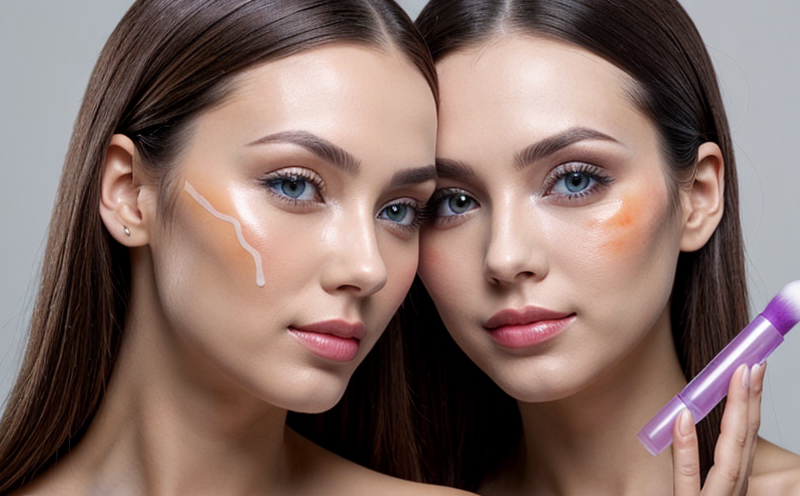Sunscreen UV Filter Testing
The sunscreen industry is a cornerstone of modern skincare and sun protection. Effective sunscreen formulations are essential to safeguard human health by shielding against ultraviolet (UV) radiation, which can lead to skin damage and increased risk of skin cancer. Sunscreens typically contain various active ingredients known as UV filters that absorb or scatter UV light. The quality and efficacy of these UV filters directly impact the performance and safety of sun protection products.
Our laboratory specializes in providing comprehensive sunscreen UV filter testing services, ensuring that formulations meet stringent global standards for efficacy, stability, and safety. This service is crucial for manufacturers to comply with regulatory requirements and to ensure their products are safe and effective for consumers.
The testing process involves several critical steps: sample preparation, application of the test method, evaluation by analytical instruments, and interpretation of results against established criteria. Our team uses advanced technologies like high-performance liquid chromatography (HPLC), Fourier-transform infrared spectroscopy (FTIR), and UV-Vis spectrophotometry to analyze the chemical content and physical properties of sunscreen formulations.
For instance, we employ HPLC for precise quantification of active ingredients such as avobenzone, oxybenzone, octinoxate, and others. FTIR helps in identifying the molecular structure of these compounds, ensuring their purity and integrity. UV-Vis spectrophotometry is used to measure the absorbance spectra of sunscreen products, which are key indicators of their ability to block UV light.
The testing process also includes stability studies under various environmental conditions, such as temperature and humidity, to evaluate the long-term performance of the formulations. Stability data is critical for ensuring that sunscreens maintain their efficacy over time and under different storage conditions. Regulatory compliance is ensured by adhering to international standards like ISO 21778:2019 and ASTM D7635-14.
In addition, our laboratory conducts toxicity assessments using in vitro methods to evaluate the potential adverse effects of UV filters on human health. This ensures that only safe and effective ingredients are used in sunscreen formulations. The results of these tests provide valuable insights into the safety profile of each ingredient and help manufacturers make informed decisions about their product development.
The importance of accurate and reliable testing cannot be overstated. Misleading or ineffective sunscreens can lead to inadequate protection, increasing the risk of skin damage and health issues. By partnering with our laboratory for sunscreen UV filter testing, manufacturers can ensure that their products meet the highest standards of quality and safety, thereby protecting consumer health and maintaining brand reputation.
Why It Matters
The significance of proper sunscreen UV filter testing cannot be underestimated. Effective sun protection is a critical component of public health strategies aimed at reducing the incidence of skin cancer and other photodermatoses. Regulatory bodies like the FDA and EU require manufacturers to demonstrate that their products meet specific efficacy, safety, and quality standards.
Accurate and reliable UV filter testing ensures that sunscreen formulations are not only effective in blocking harmful UV rays but also stable over time. This is particularly important given the changing environmental conditions and increasing awareness of sun protection among consumers. By adhering to international standards such as ISO 21778:2019, manufacturers can ensure their products meet global regulatory requirements.
Furthermore, thorough testing helps identify potential safety risks associated with specific UV filter ingredients. This information is vital for formulators to make informed decisions about ingredient selection and formulation design. By minimizing the risk of adverse effects, these tests contribute to the overall health and well-being of consumers who rely on sunscreen as a crucial part of their daily skincare routine.
Benefits
The benefits of thorough sunscreen UV filter testing are manifold. Firstly, it ensures that manufacturers produce sunscreens that meet strict regulatory requirements, thereby protecting consumer health and safety. Secondly, the results provide valuable insights into the efficacy, stability, and safety of various active ingredients, enabling formulators to make informed decisions about ingredient selection.
Accurate test results also enhance brand reputation by demonstrating a commitment to quality and safety. This can lead to increased consumer trust and loyalty, which are essential for maintaining market share and driving sales. Additionally, compliance with international standards like ISO 21778:2019 and ASTM D7635-14 helps manufacturers navigate complex regulatory landscapes and avoid costly legal challenges.
The use of advanced technologies in our testing process ensures precision and accuracy, providing reliable data that can be trusted by both industry professionals and regulators. This level of quality control is essential for maintaining the integrity of sunscreen formulations and ensuring they perform as expected under real-world conditions. Ultimately, thorough UV filter testing contributes to the overall health and well-being of consumers by delivering effective and safe sun protection products.
Why Choose This Test
Choosing our sunscreen UV filter testing service offers numerous advantages for manufacturers seeking to ensure the quality and safety of their sun protection products. Our laboratory is equipped with state-of-the-art analytical instruments and a team of experienced scientists who are dedicated to providing accurate, reliable, and compliant test results.
We offer a comprehensive range of services, including efficacy tests that measure the ability of UV filters to block both UVA and UVB radiation. Stability studies assess how well formulations maintain their effectiveness over time under various environmental conditions. Toxicity assessments using in vitro methods provide valuable insights into potential adverse effects on human health.
Our commitment to quality is reflected in our adherence to international standards such as ISO 21778:2019 and ASTM D7635-14, ensuring that all test results are consistent with global regulatory requirements. This level of compliance enhances brand reputation and fosters consumer trust. By choosing us for your sunscreen UV filter testing needs, you can be confident in the quality and safety of your products.





